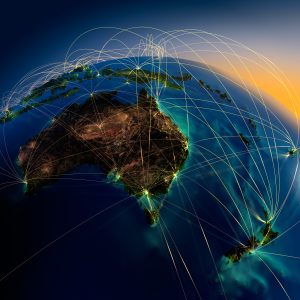Soft power can be a tricky thing for countries to pursue. Often the more a state tries to obtain or promote soft power the more it undermines it. This is because being attractive requires authenticity, and authenticity cannot be bought, it needs to be seen as organic and not contrived. Although this doesn’t preclude state investment in things like the arts, urban design, or the protection of wildlife and natural assets, yet even with the things the state can invest in, their control is not direct, and it is heavily reliant on civil society.
Where countries can be more active with their soft power is enhancing their moral authority – the values they project, the laws they enact, and the institutions they develop that provide the practical implementation of these values. A country’s reputation as a just, reliable, and empathetic society can provide it with a global standing to significantly augment its conventional power.
Australia currently finds itself at a crossroads with its moral authority. It has a new government that understands it has a lot of repair work to do after two decades of both neglect and active tarnishing of the country’s reputation. Yet the government remains bound to a number of interests and orthodoxies that will inhibit its ability to significantly enhance Australia’s moral authority.
Within Australia’s immediate region, its ability to be a trusted partner for Pacific Island countries is heavily reliant on taking climate change seriously. While the country is making inroads into shifting its domestic energy consumption to renewables, Australia is still heavily reliant on coal and natural gas as major exports. Although the new government has a better understanding than the previous government of the threat to human security that is being created by climate change, for Australia to become a regional and global leader on the issue it will require bolder action, and a desire to rethink and re-engineer its current economic structure.
While economic interests can limit the options governments feel they have, some moral choices are clearer, but rely on governments resisting their instinct to act defensively. Australia’s response to maritime asylum seekers over the past two decades has been driven by an overzealous defensiveness that has added further misery to the lives of those already fleeing misery.
Being kind, compassionate and empathetic should be the easiest things humans do. Yet all too often kindness is deemed uncommon or courageous, rather than a natural and uncomplicated trait. The Australian government has feared that compassion will create greed that the country could not afford – a belief that treating asylum seekers with dignity and respect will only invite an unmanageable amount more.
Australia’s unique geography makes this an unlikely scenario. While there may be merit in preventing dangerous maritime crossings from Indonesia, holding people indefinitely – away from legal protection – has been unnecessary and expensive. The cruelty has severely damaged Australia’s reputation. It has projected Australia’s fear to the world, making the country not only seem cold and callous, but also absurd. The 197 people currently detained on Manus Island in Papua New Guinea and Nauru could easily be resettled at a fraction of the cost it takes to detain them.
When negative behavior is normalized it often requires bold and seemingly unorthodox actions to create a circuit breaker. Prime Minister Anthony Albanese has rightly identified domestic violence as a “stain on the national soul.” Globally, domestic violence is the world’s primary security problem, yet the normative – and ineffectual – response to it remains entrenched. The first country to actually take the problem seriously with inventive new approaches would significantly enhance its moral authority.
Recently, I argued that Australia could be on the path to being this country with a new law that judges should consider domestic abuse when considering Hague Convention cases on children being moved across borders. The Hague Convention has become a tool abusive men use to prevent women and children from fleeing abuse. Unfortunately, Australia failed at its first test of this new approach last week, when an indigenous woman who had alleged domestic abuse had her two-year daughter forcibly removed and sent back to Belgium. Given the history of the Australian state removing children from their families, there is a brutal symbolism in this case.
Consideration of how Australia projects a clear set of positive values to the world should not be considered naive or an extravagance. We are currently in an era of heightened cynicism, where trust in institutions is low and hypocrisy is deemed to be the currency states trade in. This is a deeply destabilizing force that requires regaining people’s trust by demonstrating moral intent.
Australia rightly recognizes that support for Ukraine is one of the great moral tests of our era, but the principles that underpin this support should be extrapolated and applied to climate change, the treatment of asylum seekers and domestic violence as well. These are not unrelated issues; they are about placing a commitment to human security at the heart of Australia’s national strategy.

































